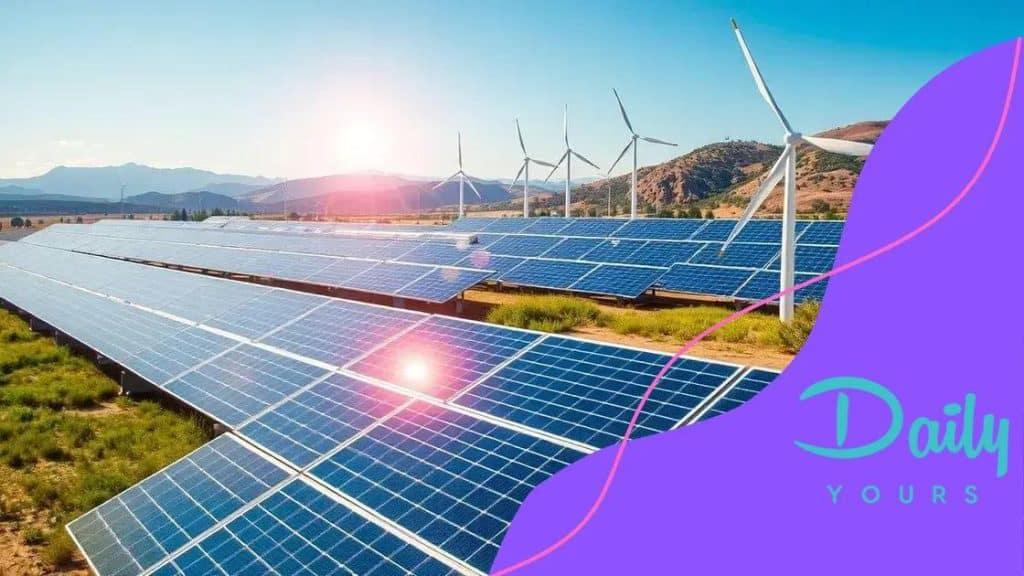Renewable energy tech breakthroughs and their economic impact

Anúncios
Renewable energy tech breakthroughs, such as advanced solar panels and efficient wind turbines, significantly impact the economy by creating jobs, reducing energy costs, and promoting sustainable economic growth.
Renewable energy tech breakthroughs are transforming our economic landscape. As innovations arise, they not only provide cleaner alternatives but also open new doors for growth and opportunity. How does this affect your everyday life and the future of our planet?
Anúncios
Overview of renewable energy technologies
Understanding renewable energy technologies is essential in today’s world. These technologies harness energy from natural sources that are constantly replenished. This includes solar, wind, hydro, and geothermal energy. By transitioning to these sustainable sources, we can reduce our dependence on fossil fuels and minimize environmental harm.
Types of Renewable Energy Technologies
There are several types of renewable energy technologies that have gained popularity. Each type plays a unique role in promoting sustainability:
- Solar Energy: Utilizes sunlight to generate electricity. Solar panels are commonly installed on rooftops or in solar farms.
- Wind Energy: Harnesses the power of the wind using turbines to produce electricity. Wind farms can be found both onshore and offshore.
- Hydropower: Uses flowing water to generate energy. Dams are often built to control water flow and maximize energy output.
- Geothermal Energy: taps into heat from beneath the Earth’s surface. It can be used for electricity generation or direct heating.
Each of these technologies not only contributes to cleaner energy but also offers economic benefits. For example, renewable energy projects create jobs and stimulate local economies. Investing in these technologies can lead to significant cost savings over time.
Anúncios
As we look towards the future, innovation in renewable energy technologies continues to evolve. New advancements are making these resources more efficient and accessible. Whether through improved solar panel designs or enhanced wind turbine capabilities, the potential for growth is enormous. It’s exciting to see how these developments can reshape our energy landscape and contribute to a more sustainable future.
Recent breakthroughs in solar and wind energy
Recent advancements in solar and wind energy have significantly changed how we think about and use renewable energy. Innovative technologies and research are paving the way for more efficient energy solutions that address both environmental and economic needs.
Solar Energy Breakthroughs
One of the most exciting developments in solar energy is the invention of perovskite solar cells. These new materials promise higher efficiency at lower costs compared to traditional silicon cells. Moreover, researchers are working on integrating solar technology into building materials, such as solar windows and roof tiles, which can blend seamlessly into our architecture.
Another breakthrough is the improvement in energy storage systems. With better batteries, solar energy can be stored more effectively, allowing households to use energy even when the sun isn’t shining. This change not only boosts efficiency but also enhances the reliability of solar power.
Wind Energy Advancements
In the realm of wind energy, larger and more efficient turbines are making a significant impact. Today’s wind turbines can generate more power even at lower wind speeds, thanks to improved blade designs and materials. This means more energy harnessed from fewer turbines, reducing costs and land use.
Floating wind farms are another revolutionary concept. These farms can be placed in deeper waters where winds are stronger and more consistent. By harnessing offshore wind, we can significantly increase our renewable energy output. Such advancements ensure that wind energy continues to grow as a crucial part of our energy mix.
Both solar and wind energy are experiencing rapid transformations that will define the future of energy. Continuous research and innovation bring us closer to a sustainable energy future.
Economic impact of renewable energy adoption

The economic impact of renewable energy adoption is profound and far-reaching. As economies transition from fossil fuels to renewable sources, significant changes are occurring in job creation, energy costs, and overall economic growth.
Job Creation
One of the most notable benefits is job creation within the renewable energy sector. This growing industry requires skilled workers for various roles, including:
- Installation Technicians: These professionals set up solar panels and wind turbines.
- Engineers: They design more efficient renewable energy systems.
- Technicians: They maintain and repair energy systems to ensure optimal performance.
- Research and Development Specialists: These experts explore new technologies and improvements.
As the demand for renewable energy increases, so do the job opportunities, positively impacting local and national economies.
Reduction in Energy Costs
Adopting renewable energy leads to lower energy bills for consumers and businesses. With advancements in technology, the cost of solar and wind energy has decreased significantly over the past few years. It is now often cheaper than traditional fossil fuels. This reduction in energy costs helps households save money and stimulates economic activity as more funds become available for spending on other goods and services.
Furthermore, renewable energy sources help stabilize energy prices. Unlike fossil fuels, which can fluctuate due to market conditions, renewables rely on naturally occurring resources, providing a more stable energy cost over time. This predictability allows businesses to plan for the future with greater confidence.
Overall Economic Growth
The shift towards renewable energy can also drive economic growth by attracting investments. Governments and private companies see the potential for long-term returns in sustainable energy projects. Investments in renewables promote innovation and increase competition, leading to better products and services.
As economies grow greener, they can become less reliant on imported fossil fuels. This shift enhances energy security and protects against volatility in global oil markets. Thus, the economic benefits of renewable energy adoption create a more resilient and sustainable future.
Challenges faced by renewable energy sectors
The renewable energy sector faces various challenges that can impede its growth and effectiveness. Understanding these hurdles helps us address them and improve the adoption of sustainable technologies.
Intermittency of Energy Sources
One major challenge is the intermittency of renewable energy sources. Solar and wind energy are dependent on weather conditions and time of day. This means energy generation can vary significantly. For example, solar panels produce little energy on cloudy days or during the night. This variability can create challenges for energy grids trying to maintain a constant supply.
To tackle intermittency, energy storage solutions, like batteries, are becoming crucial. Effective storage technologies allow excess energy generated during peak production times to be saved for later use. However, developing affordable and efficient storage remains a significant challenge.
Infrastructure Limitations
Another significant challenge is the need for proper infrastructure. Many regions lack the existing grid capabilities to support renewable energy integration. Upgrading transmission lines and building new energy infrastructure can require substantial investment. Without these upgrades, the full potential of renewable energy cannot be realized.
Furthermore, location is crucial. Wind farms may be built in remote areas far from population centers, leading to challenges in delivering that energy to where it’s most needed. Improving infrastructure will play a vital role in making renewable energy more accessible.
Regulatory and Policy Barriers
Regulatory and policy issues present another hurdle. In many regions, outdated regulations favor traditional fossil fuels over renewable options. Navigating these regulations can complicate the permitting process for new renewable projects. Moreover, lack of long-term government support can limit investments in renewable energy.
Changing policy to better support renewables, such as providing incentives or subsidies, will be necessary to promote growth in the sector. This change would encourage more players to enter the market and drive innovation.
In addition, public perception and misinformation can yield resistance to renewable projects. Educating communities about the benefits and feasibility of renewable energy can help overcome these social challenges. By addressing these obstacles head-on, the renewable energy sector can work towards a sustainable and viable future.
Future trends in renewable energy and economy
The future of renewable energy is bright and full of promise. As technology advances, we can expect significant changes that will reshape both energy and economic landscapes.
Increased Efficiency and Cost Reduction
One key trend is the continuous improvement in the efficiency of renewable energy systems. Innovations in solar panels and wind turbines are making them more effective at generating energy. For instance, new materials and designs could lead to panels that produce more energy with less sunlight. This increase in efficiency goes hand in hand with a reduction in costs, making renewable energy more accessible for everyone.
- Advanced Solar Technologies: New solar technologies like bifacial panels can capture sunlight from both sides, enhancing energy output.
- Enhanced Wind Turbines: Developments in turbine design can lead to larger, more powerful machines that generate more electricity.
- Improved Energy Storage: Breakthroughs in battery technology allow for better energy storage, improving the reliability of renewable sources.
As these technologies become mainstream, lower energy costs can stimulate economic growth and job creation in various sectors.
Integration of Smart Technologies
Another exciting trend is the integration of smart technologies into the energy grid. Smart grids utilize digital communication to optimize energy distribution and consumption. This means that energy can be used more efficiently, reducing waste and lowering costs.
Households and businesses will increasingly use smart devices to monitor and manage energy use. For instance, smart thermostats and energy management systems allow users to optimize their energy consumption and save money on utility bills.
Additionally, the growth of electric vehicles (EVs) will play a crucial role in shaping energy demand. As more people switch to EVs, there will be greater demand for charging stations powered by renewable energy. This will further encourage the integration of renewables into the energy mix.
Global Policy and Investment Trends
Global policies are also shifting to favor renewable energy. As concerns about climate change grow, governments around the world are implementing stricter regulations on carbon emissions. This shift encourages investment in renewable energy projects and technologies.
Moreover, private investors are increasingly looking to fund sustainable energy initiatives. The rising interest in green finance and sustainable investments will lead to more resources directed towards the renewable sector. This move will not only boost the economy but also align financial markets with environmental goals.
Overall, the future trends in renewable energy and the economy point toward a more sustainable and vibrant world, where clean energy drives economic development.
FAQ – Frequently Asked Questions about Renewable Energy and its Economic Impact
What are the main benefits of renewable energy?
Renewable energy reduces greenhouse gas emissions, creates jobs, and provides a sustainable energy source.
How does renewable energy contribute to job creation?
The renewable energy sector provides various job opportunities in installation, maintenance, and technology development.
What challenges does the renewable energy sector face?
Challenges include energy intermittency, infrastructure limitations, and regulatory barriers.
How can technology improve renewable energy efficiency?
Advancements in technology lead to more efficient systems, like better solar panels and improved energy storage solutions.





